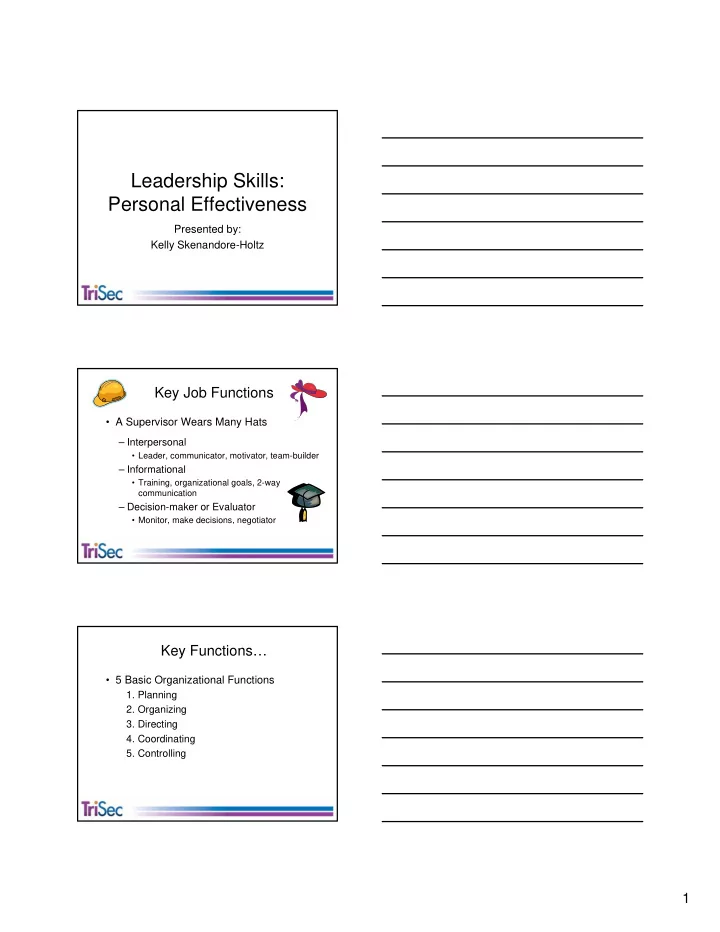

Leadership Skills: Personal Effectiveness Presented by: Kelly Skenandore-Holtz Key Job Functions • A Supervisor Wears Many Hats – Interpersonal • Leader, communicator, motivator, team-builder – Informational • Training, organizational goals, 2-way communication – Decision-maker or Evaluator • Monitor, make decisions, negotiator Key Functions… • 5 Basic Organizational Functions 1. Planning 2. Organizing 3. Directing 4. Coordinating 5. Controlling 1
What Your Employees Need From You • It all boils down to what your employees need to know. • Employees need to know: – What has to be done – How to do it – And are they doing it correctly? • How will they know this? What You Need From Your Employees • Are your expectations being met or to be exceeded? • Is there professionalism when working with co-workers or vendors? • How do you express your needs to your employees? – Weekly, Monthly meetings, – Notices, – General Conversation Communication is Critical • In order to give employees the information and feedback they need, a good manager must be a good communicator. • Communication skills will impact every area of your success as a manager. • Remember that you also communicate through your attitude and your confidence. 2
Prioritize Your Tasks • Before you can communicate with your employees, you have to determine your priorities and define the employees’ jobs. • How do you define the employee’s job? – Using the job description as a tool – Importance of a clear and accurate job description – Are all aspects of the job description equally critical? Prioritize Your Tasks, (cont’d.) • Determining priorities – Break down “To-Do’s” into manageable tasks – List and review tasks (yours and your employees’) – Determine which are important/urgent – What things should you do vs. what things can you delegate? Delegation • Dealing with the demands on your time • A manager cannot do it all - delegate by: – Determining the results expected – Assigning tasks to a position – Communicating task requirements – Assigning authority for accomplishing the tasks – Ensure accountability – Provide feedback • Are all tasks appropriate for delegation? 3
Setting Expectations • Remember #1 on list of key functions • What has to be done? • Set expectations – Decide what is important • Narrow your focus – Start with high standards • Ambitious but achievable – Communicating your expectations • Reinforce and counsel early if needed Providing the Tools to do the Job • Now that they know what the job is, remember #2 on list of key functions • How to do it? • Is there such a thing as over supervision? Supervising the Work • Beyond the performance appraisal process • Daily observations – Positive and negative – MBWA ( M anagement B y W alking A round) • Being visible and accessible • Reinforcement • Assess reasons for low performance 4
Establishing Standards • Three Aspects of Feedback to Employees 1.Performance Standards 2.Informal, day-to-day feedback 3.Performance appraisal Performance Standards • Standards in an organizational setting • Determine the level of acceptable performance – Method of measurement and – Set an acceptable level • Writing the performance standard – Describes the acceptable level of performance and – Describe the activity being measured Informal, Day-To-Day Feedback • Three Simple Parts to One-Minute Feedback 1. Be aware of the employee’s performance standards and give feedback to a related standard. 2. Identify specific and concrete behavior on which feedback is about. 3. Identify the outcome of the behavior to the success of the organization. 5
The Performance Appraisal • Performance Rating • Reaction of the Individual • Closing the Session • Results of the Session • Possible Personnel Actions • Possible Plans of Actions Providing Feedback • When counseling, remember the “sandwich principle” – Positive—negative—positive – Focus on the positive Providing Feedback • Say what you mean, mean what you say – Maintain your integrity – Build respect • Document your interactions 6
Thank You Enjoy the Conference! 7
Recommend
More recommend